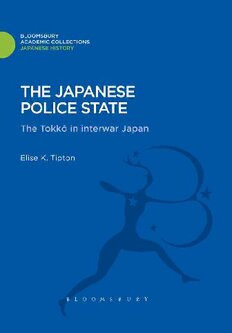
The Japanese Police State: Tokko in Interwar Japan PDF
Preview The Japanese Police State: Tokko in Interwar Japan
THE JAPANESE POLICE STATE The Tokko in interwar Japan This page intentionally left blank THE JAPANESE POLICE STATE The Tokko in interwar Japan Elise K. Tipton BLOOMSBURY ACADEMIC COLLECTIONS Japanese History B L O O M S B U RY LONDON • NEW DELHI • NEW YORK • SYDNEY Bloomsbury Academic An imprint of Bloomsbury Publishing Pic 50 Bedford Square 1385 Broadway London New York WC1B3DP 10018 UK USA www.bloomsbury.com First published in 1990 This edition published in 2012 by Bloomsbury Publishing pic © EliseTipton, 2012 All rights reserved. No part of this publication may be reproduced or transmitted in any form or by any means, electronic or mechanical, including photocopying, recording, or any information storage or retrieval system, without prior permission in writing from the publishers. EliseTipton has asserted her right under the Copyright, Designs and Patents Act, 1988, to be identified as Author of this work. No responsibility for loss caused to any individual or organization acting on or refraining from action as a result of the material in this publication can be accepted by Bloomsbury Academic or the author. Bloomsbury Academic Collections ISSN 2051-0012 British Library Cataloguing-in-Publication Data A catalogue record for this book is available from the British Library. ISBN: 9781780939728 (cloth) ISBN: 9781780933221 (Bloomsbury Academic Collections: Japanese History) ENTIRE COLLECTION ISBN: 9781780933184 (Bloomsbury Academic Collections: Economics, Politics and History of Japan) Library of Congress Cataloging-in-Publication Data A catalog record for this book is available from the Library of Congress. Printed and Bound in Great Britain CONTENTS Introduction 1 Studies of the police in prewar Japan Studies of the police in general The political and social roles of the police The Tokko in prewar Japan: factors to consider Totalitarian, fascist or authoritarian The concept of a police state Chapter 1 The suppression of the left 17 The suppression of the Meiji socialist movement The emergence of a new suppression policy The development of the suppression Explanations of the suppression Chapter 2 The police tradition 35 The police tradition from the Meiji period The political police within the police tradition The origins of the police ideology Chapter 3 Rule by law 52 The Tokugawa legacy The Meiji legacy The Peace Preservation Law Rule by law during the 1930s Chapter 4 Professionalism 74 A professional people's police A professional emperor's police Internal divisions Problems of professionalism V vi Contents Chapter 5 The emperor's police ideology 105 Conflict with the Justice Ministry Conflict with the Kenpeitai The origins and functions of the emperor's police ideology Chapter 6 The Japanese police state 134 The domestic context of the Japanese police state The Japanese police state in comparative perspective Appendixes 154 I The Tokko chain of command in the 1930s II Disposition of Peace Preservation Law violations III Disposition of right wing related cases Notes 159 Introduction Chapter 1 Chapter 2 Chapter 3 Chapter 4 Chapter 5 Chapter 6 Bibliography 188 Index 207 ACKNOWLEDGEMENTS I would like to express my appreciation for the assistance of various people and institutions which have made this book possible. Thanks go to George M. Wilson, Richard Mitchell, Lawrence Olson, and David Titus for reading the original dissertation and making many comments and suggestions for revising the manuscript. In Japan research was made possible by affiliation with the Institute for Social Science at the University of Tokyo. There I benefited from the expertise of Professor Okudaira Yasuhiro. Nakahara Hidenori and the staff of the International Service Section of the National Diet Library were very helpful. Financial support came from a Fulbright-Hays Dissertation Abroad Fellowship and a Comparative History Research grant from the University of California at Santa Cruz. Appreciation also to Julie Manley for typing the manuscript and to Fiona Inglis and the editorial staff at Allen and Unwin Australia for seeing the manu- script through publication. It is customary to thank children and spouses last, although, as in this case, they often deserve first acknowledgement. Lee and Chris- tine need to be thanked for their patience. Special thanks must go to my husband, Ben, who has acted as a sounding board through the years and whose critical reading of the manuscript was invaluable for the revisions. Note: Japanese names have been rendered according to the custom- ary Japanese order of surname first. vii This page intentionally left blank INTRODUCTION 'If you say "Tokko", even a crying child falls silent.' Takagi Takeo, 19541 Spectres from the prewar period continue to haunt Japan. Central to the image of prewar Japan is the brooding sense of menace inspired by the Special Higher Police (Tokubetsu Koto Keisatsu), commonly known as the Tokko. In 1954 memories of Tokko terror remained fresh, but in 1975 the editors of a multivolume docu- mentary history of the Tokko ominously warned that the Tokko still lived.2 In 1984 the author of a history of the Tokko worried that today's security police was becoming the Tokko of the future, and a popular NHK television series introduced another generation of Japanese to the picture of Tokko brutality. Even more recently in 1990, an Asahi shinbun article noted that police intervention in certain high schools over teachers' statements about the January general election reminded some people of the prewar Tokko.3 This continuing nervousness about a resurrection of the Tokko derives from analogies made between the Tokko on the one hand and Hitler's Gestapo and Stalin's State Political Administration, better known as the GPU, on the other. Discussion of the significance of political repression is therefore premised on moral judgements rooted in the shock of defeat 45 years ago. 1
